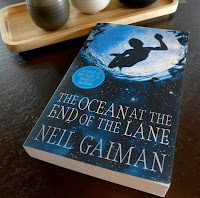Got my grubby hands on the new novel by Neil Gaiman, 'The Ocean at the End of the Lane'. I grew up in the world of Morpheus, in the Dreaming. I'm a total fangirl.
SPOILERS ABOUND. YOU, FANS WHO HAVEN'T READ THIS BOOK, STOP READING THIS POST NOW.
Neil Gaiman's about the only dude whom I had willingly stood in a line for hours to get a smile and a signature on my Sandman comics. (And Amanda Palmer. No others. Especially not rock stars.) So, I can have no independent opinion of this book. I love it. (Reviews here, here and here.) Before the Prologue, the book opens with a quote from writer-illustrator Maurice Sendak, in conversation with Art Spiegelman. Both of whom I eagerly devour all their graphic novels. I say it again, fairy-tales are grim, and that's why I love them.
I remember my own childhood vividly... I knew terrible things. But I knew I mustn't let adults know I knew. It would scare them.
Maurice Sendak,
in conversation with Art Spiegelman
The New Yorker, 27 September 1993
The adult world recedes as our nameless narrator-protagonist takes us back to 1960s Sussex countryside. Full of adult-world pain, he finds solace in his 7-year-old self's memories. Many quotes from Lewis Carroll's 'Alice's Adventures in Wonderland', especially of the scene of the Mouse in The Pool of Tears. Of course there would be a childhood partner-in-crime, Lettie Hempstock, who's just a few years older at eleven, living next door with her grandmother and mother. I can't decide if I want to interpret Lettie's going-away as a drowning, or believe what the adults said- that she went to Australia to be with her father.
Old Mrs Hempstock says that Lettie isn't dead,' I said. 'But she looked dead. I think she is actually dead. I don't think it's true that she's not dead.'
Ginnie looked like she was going to say something about the nature of truth, but all she said was, 'She's hurt. Very badly hurt. The ocean has taken her. Honestly, I don't know if it will ever give her back. But we can hope, can't we?'
'Yes.' I squeezed my hands into fists, and I hoped as hard as I knew how.
Neil Gaiman is fabulous in using plain language to convey the most surreal of dreams into plausible reality. The "ocean" in the title simply refers to the pond. A pond at the end of the lane. It will seem like huge expanse of water to a child. Later on, there's a cat who wandered into the protagonist's house and is named 'Ocean'. There you go. Let your imagination run free. Thus begins the tale of wonder, terror, of monsters (in the form of childhood nanny Ursula Monkton), a fairy ring, maybe-witches, and a final showdown of fantastical birds, creatures, shadows and tunnels.
Read the tales with a child's eye; you'll see the magic.
I coughed again, and it felt like the water fled my nose, my throat, my lungs. I pulled clean air into my chest, in the light of the huge, full harvest moon that shone on the Hempstocks' red-tiled roof, and for one final perfect moment, I still knew everything: I remember that I knew how to make it so the moon would be full when you needed it to be, and shining just on the back of the house, every night.

No comments:
Post a Comment